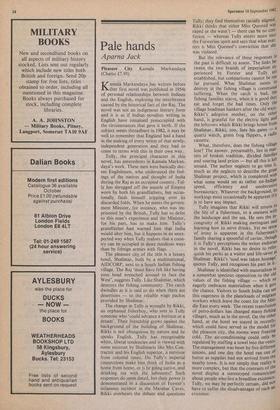Pale hands
Aparna Jack
Pleasure City Kamala Markandaya (Chatto £7.95)
KamalKamala Markandaya has written before first novel was published in 1954) of personal relationships between Indians and the English, exploring the interference caused by the historical fact of the Raj. The novel was not an indigenous literary form and it is as if Indian novelists writing in English have remained preoccupied with the circumstances that gave it birth. If the subject seems threadbare in 1982, it may be well to remember that England had a hand in the making of every writer of that newly- independent generation and they had to come to terms with this in their own way.
Tully, the principal character in this novel, has antecedents in Kamala Markan- daya's work. These men were basically dec- ent Englishmen, who understood the feel- ings of the natives and thought of India during the Raj as an occupied country. Tul- ly has shrugged off the mantle of Empire worn by both his grandfathers, but occas- ionally finds himself tripping over its discarded folds. When he meets the govern- ment Minister, for instance, who was im- prisoned by the British, Tully has to defer to this man's experience and the Minister, for his part, has to make him. Tully's grandfather had warned him that India would alter him, but it happens in an unex- pected way when Tully realises that a coun- try can be occupied in more insidious ways than by foreign armies with flags.
The pleasure city of the title is a luxury hotel, Shalimar, built by a multinational, AIDCORP, next to a South Indian fishing village. The Raj 'must have felt like having your, head wrenched around to face the West', suggests Tully. Like Shalimar, which destroys the fishing community. The catch dwindles as it is said to do when there are desertions — to the reliable wage packet provided by Shalimar.
The change in Tully is wrought by Rikki, an orphaned fisherboy, who sees in Tully someone who 'could advance a horizon or a dream'. Their friendship grows against the background of the building of Shalimar. Rikki is not obsequious by nature and he speaks English. Tully has recognisable white, liberal tendencies and is viewed with some mistrust by Shalimaris like Mrs Con- tractor and his English superior, a survivor from colonial times. Do Tully's imperial connections make him think of India as a home from home, or is he going native, and drinking tea with the labourers? Such responses do seem dated, but their power is demonstrated in a discussion of Forster's infamous incident in the Marabar Caves. Rikki overhears the debate and questions Tully; they find themselves racially aligned. Rikki thinks that either Miss Quested was raped or she wasn't — there can be no con- fusion — whereas Tully enters more into the Forsterian spirit and says that what mat- ters is Miss Quested's conviction that she was violated.
But the relevance of these responses to the past is difficult to assess. The links be- tween the two brands of imperialism ex-
perienced by Forster and Tully are established, but comparisons cannot be too far pursued. What Shalimar seems to
destroy in the fishing village is communal suffering. When the catch is bad, the
fishing families starve, when it is good they eat and forget the bad times. Only the village headman hankers after the old waYs.
Rikki's adoptive mother, on the other hand, is grateful for the electric light and the leftovers which Rikki brings home from
Shalimar. Rikki, too, lists his gains — a quartz watch, green frog flippers, a radio cassette.
What, therefore, does the fishing village lose? The answer, presumably, lies in mat' ters of broken tradition, divided families
and soaring land prices — but all this is left unsaid. The author neglects to go into it,
much as she neglects to describe the great Shalimar project, which is completed with what some would see as rather un-Indian
speed, efficiency and unobtrusive bureaucracy. Whatever the background, its workings must occasionally be apparent if it is to have any impact.
Tully imagines that Rikki will return to the life of a fisherman, to a oneness with
the landscape and the sea. He sees the in- congruity of Rikki making meringues and learning how to serve drinks. Yet no sense of irony is apparent in the fisherman's
family sharing a spoonful of caviar, though it is Tully's perceptions the writer endorses
in the novel. Rikki has no desire to relin- quish his perks as a waiter and life-saver at Shalimar. Rikki's 'soul was taken hostage quotes Tully, and recognises his part in it.
Shalimar is identified with materialism in a somewhat specious opposition to the old values of the fishing village — which so eagerly embraces materialism when it gets the chance. Visitors to South India can see
this eagerness in the planeloads of migrant workers which leave the coast for the Mid- dle East every week. The recent transfusion of petro-dollars has changed many fishing villages, much as in the novel. On the other hand, at the hotel we stayed in recently' which could have served as the model for the pleasure city, the rooms were freezing cold. The air-conditioning could only be regulated by stuffing a towel into the vents. The management was beset by five different unions, and one day the hotel ran out of butter as supplies had not arrived from the nearby town. It is not simply that reality is more complex, but that the contrasts of the novel display a stereotyped romanticism about people who live a breadline existence. Tully, we may be perfectly certain, did not have to suffer the disadvantages of such an existence.


































 Previous page
Previous page